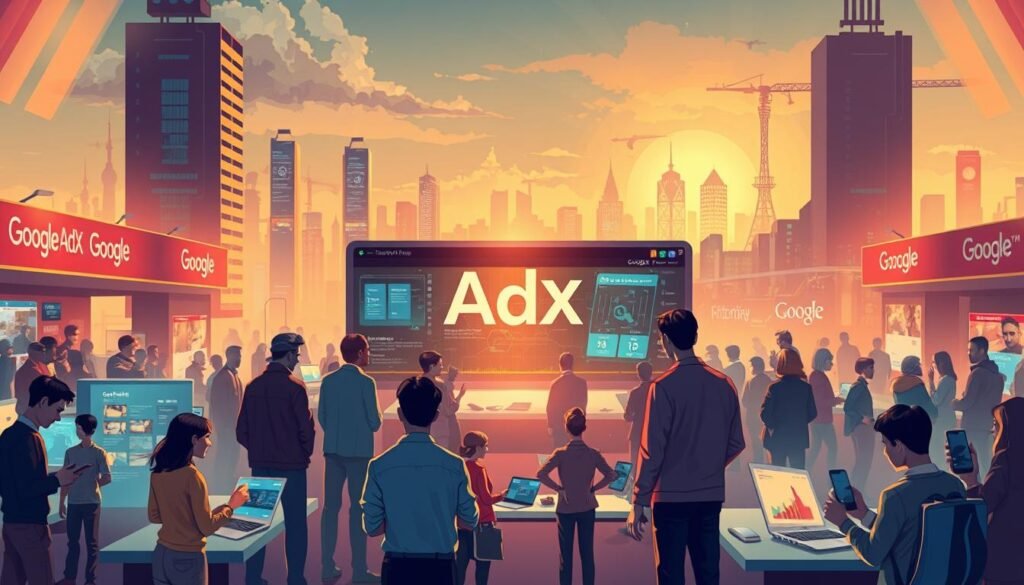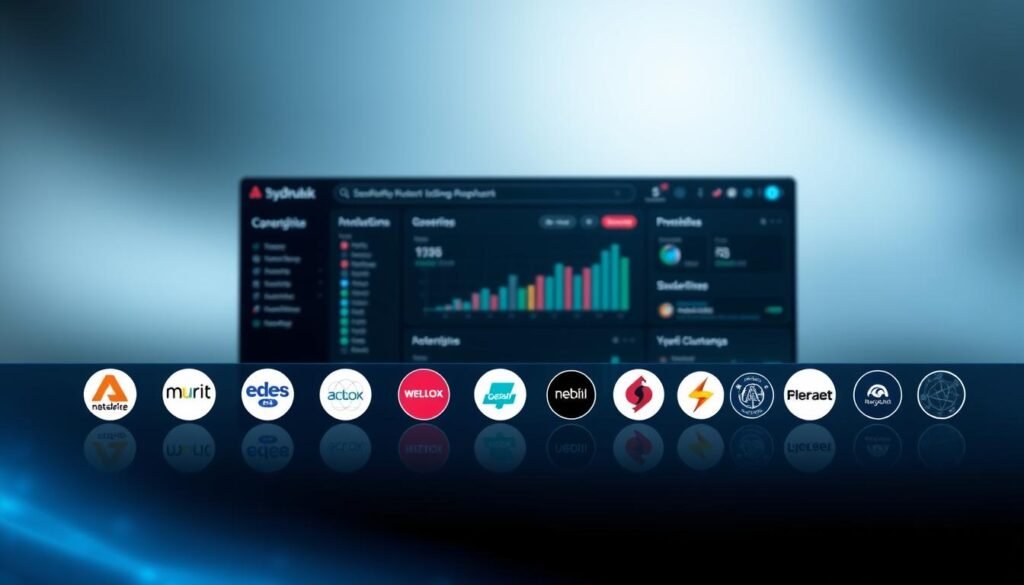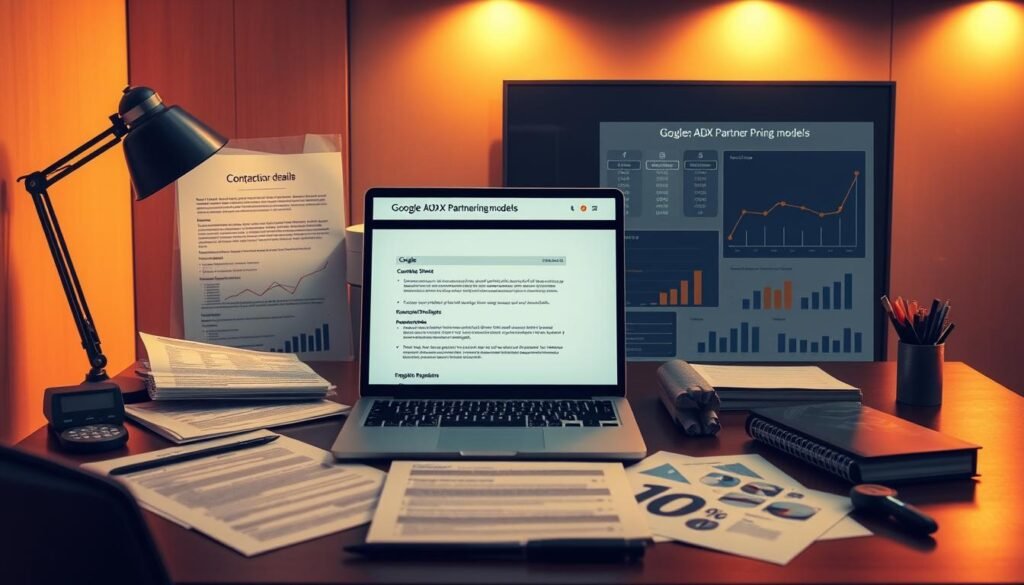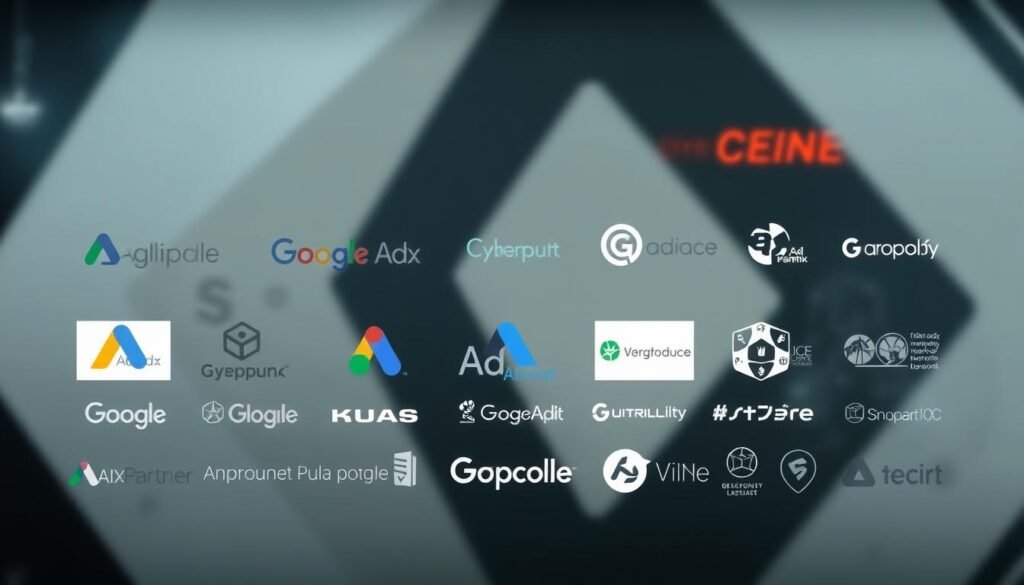This guide is for small and medium publishers in the United States. It helps them find the best Google AdX partners and authorized resellers to increase ad revenue. Google AdX is a marketplace where publishers meet premium demand and advertisers bid on impressions.
For SMB publishers, joining the Google AdX partnership program is key. It gives access to more demand, often better eCPMs, and more control over inventory and pricing. This can lead to higher yields and better fill rates.
The article will cover why to choose Google AdX partners, the role of consultants, and a review of the best partners. It also talks about reseller verification, onboarding, performance metrics, and contract and pricing considerations. Each section offers actionable advice and comparison points to help publishers choose the right partner.
Key Takeaways
- Google AdX Partners connect publishers with premium demand and real-time bidding.
- Top google adx partners can raise eCPMs and improve fill through broader demand.
- The google adx partnership program includes resellers and consultants who offer implementation and optimization support.
- Evaluate partners on transparency, technical onboarding, and performance reporting.
- This guide targets U.S.-based SMB publishers, ad ops managers, and independent site owners seeking practical vendor comparison points.
Why Choose Google AdX Partners for Small and Medium Publishers

Small and medium publishers often face tight technical resources and limited direct access to premium programmatic demand. Partnering with experienced firms can unlock inventory value, speed up onboarding, and simplify ongoing operations.
Benefits of partnering with authorized Google AdX resellers
Authorized Google AdX resellers give publishers access to premium buyers and demand-side platforms. These partners maintain agency relationships and header bidding connections. This increases bid density and advertiser interest.
Resellers offer managed account services like floor pricing strategy and packaging for auctions. They also ensure policy compliance. Publishers get hands-on support for setup, consent management, and escalations within the Google AdX partnership program.
Resellers provide specialized services like video and CTV optimization, private marketplace deal negotiation, and tailored analytics dashboards. Faster access to new AdX features and direct Google support often follows certified reseller status.
How AdX partners improve yield and fill rates
Partners use dynamic floor pricing and bid shading optimization to lift effective CPMs while protecting fill. Header bidding wrappers and hybrid waterfalls boost bid density across demand sources.
Programmatic guaranteed and PMP deals reduce reliance on remnant demand and increase predictable revenue. Continuous A/B testing of sizes, placements, and refresh intervals improves viewability and advertiser response.
Active monitoring and IVT mitigation protect eCPM and long-term publisher trust with buyers. These operational steps help sustain higher fill rates and clearer revenue signals.
When to consider a partner versus self-serving AdX
Choose a partner when you lack in-house ad ops or engineering bandwidth. You may need rapid AdX onboarding or advanced yield management without hiring staff. Partners offer technical support, managed optimization, and time savings.
Self-serving AdX works for publishers with scale, experienced programmatic teams, and direct Google account access. In those cases, maintaining control can reduce fees and preserve margins.
Evaluate fees and projected lift carefully. Partners charge revenue share or management fees. Balance those costs against expected eCPM gains, operational savings, and time-to-revenue improvements from the Google AdX partnership program.
How Google Ad Exchange Consultants Drive Revenue Growth
The right consultant can turn data and tags into more money. Publishers get audits, fixes, and deals that boost eCPMs and revenue. Advisors work with experts to improve auctions, tags, and private deals that meet publisher goals.

- Revenue optimization audits that review eCPM, fill rates, bid density, and tag redundancy.
- Technical integration and tag migration, including Google IMA for video, GPT implementation, and header bidding wrappers.
- Auction and floor price strategy: dynamic floors, PMP negotiations, and programmatic guaranteed experimentation.
- Reporting and analytics: custom dashboards, KPI setting, and ongoing performance monitoring.
- Policy and brand-safety support with inventory categorization and verification tool integration.
Case studies: consultant-led lift for SMB publishers
Consultants often see big improvements. They report 15–40% eCPM boosts from header bidding and 10–25% revenue increases from PMP and guaranteed deals.
Wins include removing duplicate tags and optimizing ad sizes for better viewability. Consolidating demand sources also improves fill rates. Results vary by vertical, location, and inventory quality, with U.S. audiences often getting higher CPMs.
Choosing a consultant based on publisher goals
- Display-focused publishers should seek consultants with deep header bidding and viewability experience.
- Publishers prioritizing video and CTV need consultants skilled in IMA, GAM video line items, and programmatic guaranteed workflows.
- Sites that need technical onboarding must choose consultants with proven GPT, CMP, and tag audit track records.
When picking a firm, compare credentials, client references, and case studies. Look for clear scopes that show the difference between audits and ongoing optimization. The best partners and consultants make their impact clear and match publisher goals.
Top Google AdX Partners
Small and medium publishers have many options to grow their programmatic revenue. They can choose from programmatic-focused companies, full-service ad tech agencies, and specialized header bidding vendors. Many pick top google adx partners for a mix of technology, access, and managed services.

Overview of leading partners serving small and medium publishers
- Programmatic SSPs like Magnite and PubMatic offer wide demand connections and native AdX integrations.
- Full-service agencies handle yield, reporting, and client relationships for publishers who prefer outsourcing.
- Smaller, authorized google adx resellers provide managed AdX access and customized onboarding for publishers without direct AdX accounts.
- Header bidding specialists focus on pre-bid orchestration to increase bid density and eCPMs for publishers with diverse inventory.
Comparing pricing models and service tiers
- Revenue share: partners take a percentage of ad revenue. This aligns incentives but changes net yield calculations.
- Flat management fees: predictable monthly costs for publishers with steady volumes.
- Hybrid models: fixed fee plus performance bonuses for achieving agreed goals.
- Tiered services: basic tag setup, managed yield optimization, and premium packages with PMP handling and custom analytics.
- When evaluating offers, check included items: supported ad units, reporting depth, SLA response times, and experimental testing.
Partner specializations: header bidding, programmatic guaranteed, analytics
- Header bidding experts supply wrappers, adapter integrations, and latency controls to improve auction competition.
- Programmatic guaranteed teams help structure direct deals with brands and agencies, securing fixed buys for premium inventory.
- Analytics-focused partners provide custom dashboards, attribution modeling, and incremental revenue measurement to quantify impact.
- Some publishers prefer google adx certified resellers that combine reseller access with proprietary tooling and direct DSP relationships.
Choose partners based on technical needs, transparency, and the exact mix of services. Comparing fee structures and service levels helps match publisher goals with the right partner profile when engaging top google adx partners or authorized google adx resellers.
Authorized Google AdX Resellers: What to Look For
Choosing the right reseller is key for small and medium publishers. Look for verification, clear contracts, and good technical support. This helps avoid surprises and keeps your earnings safe.

Verification and certification checks
Make sure the reseller is real by checking Google’s partner directory. Or ask them for written proof from Google. Good teams show off their credentials and success stories with mid-market publishers.
Ask for proof of staff certifications like Google Ad Manager badges. Also, check if they’re members of IAB or TAG. Client references and a list of clients can confirm their experience.
Contract terms and revenue-sharing transparency
Understand how revenue share works and if there are fees before or after costs. Ask for examples to see how net revenue is calculated. This avoids confusion about what you’ll really get paid.
Check for fees for extra services like custom integrations or reporting tools. Ask for a sample invoice with clear fees and what you get for your money.
Support SLAs and technical onboarding
Get a copy of the service-level agreement (SLA). It should outline response times for technical issues and policy disputes. A clear SLA means less downtime and faster problem solving.
Review the onboarding process: timeline, tag testing, and staging environments. Make sure they offer hands-on ad ops and a dedicated technical manager. Also, confirm they have formal paths to escalate issues with Google.
If they claim to be a certified Google AdX reseller, check their ongoing support and optimization plans. Ask about their reporting and how often they review quality.
Best Google AdX Partners for Specific Publisher Needs
Choosing the right partner depends on what you have to sell, who you want to reach, and how much money you want to make. Below are focused options to match common publisher needs. They help you pick from the best google adx partners and top ad exchange partners in the market.
Partners focused on high-quality display inventory
- These partners connect publishers to premium demand and private marketplace deals. They help increase CPMs for lifestyle, finance, and news sites.
- Expect services such as creative review, ad placement optimization, lazy-loading, and viewability improvement.
- Look for documented case studies that show higher viewability and brand-safe outcomes from google adx partners working with major brand buyers.
Partners that prioritize video and CTV monetization
- Video-focused partners support Google IMA, VAST/VPAID, and programmatic guaranteed deals for long-form and connected TV inventory.
- They handle transcoding, ad pod sequencing, and video-centric viewability metrics that matter to agencies and brand advertisers.
- When selecting from top ad exchange partners, verify experience negotiating CTV programmatic buys and managing VAST wrappers.
Partners optimized for mobile and AMP publishers
- Mobile specialists implement AMP-compliant tags, responsive creatives, and mobile-first ad units. They preserve page speed and retention.
- They address mobile constraints like limited ad density, consent management for GDPR and CCPA, and in-app vs mobile web nuances.
- Seek partners with proven lifts in mobile eCPMs and technical expertise among google adx partners. Ensure smooth AMP or app deployments.
Google AdX Implementation Experts and Onboarding
Starting with google adx partners can seem complex. Publishers do better with a clear plan, precise steps, and consent checks. The right team cuts down mistakes and speeds up revenue.

- First, an audit (about 1 week) to check current tags, creatives, and inventory.
- Then, tag setup and testing (1–3 weeks) for GPT, Google IMA, and header bidding.
- After that, live testing and tweaks (1–4 weeks) to improve performance.
- Smaller sites with few ads can finish in under two weeks.
Key technical integrations: tags, consent, and ad units
- Google Publisher Tags (GPT) and Google IMA for video need correct placement to avoid double counting.
- Header bidding wrappers like Prebid.js or server-side solutions connect to AdX.
- Consent Management Platform (CMP) is needed for GDPR and CCPA compliance.
- Correct ad unit mapping, targeting, and sizes improve bid density and earnings.
Common pitfalls during implementation and how partners prevent them
- Duplicate tags can inflate metrics. Experts do audits to find and remove them.
- Header bidding latency hurts user experience. Partners use async loading and strict timeouts.
- Misconfigured CMPs block demand. Certified resellers check consent flows and tag behavior.
- Policy issues with creatives can block revenue. Partners vet demand and manage approvals.
With google adx implementation experts, publishers get a clear onboarding plan. This partnership boosts confidence and speeds up monetization.
Evaluating Performance: Metrics to Track with AdX Partners
Tracking the right metrics is key for publishers to see the value of their partners. Work with google adx partners or google ad exchange consultants. They can help you create a dashboard that shows yield, demand health, and ad quality. Use these figures during weekly and monthly reviews.
Revenue metrics
- eCPM: Track by ad unit, device, and geography to see where yield rises or falls.
- CPM trends: Split by channel — display, video, native — to detect seasonality and buyer valuation shifts.
- Total revenue: Report net of partner fees to judge the true lift from top ad exchange partners.
Fill rate, bid density, and auction dynamics
- Fill rate: Measure how often requests return a bid. Low fill often signals setup issues or missing demand.
- Bid density: Count bids per impression. More bidders usually push eCPMs higher.
- Auction dynamics: Monitor first-price versus second-price outcomes, bid shading, and reserve effects to understand pricing behavior.
Quality metrics
- Viewability: Use MRC-compliant measures. Higher viewability boosts advertiser willingness to bid.
- Invalid traffic (IVT): Deploy verification tools such as DoubleVerify or Integral Ad Science alongside Google signals to limit wasted impressions.
- User experience: Track page load time, CLS, and LCP impact from ads. Poor UX can lower traffic and long-term revenue.

Regularly discuss these metrics with google ad exchange consultants and top ad exchange partners. This helps during optimization sprints. Short feedback cycles let you test changes in header bidding setups, ad density, and lazy-load rules. This way, you can avoid risking user experience or revenue.
Top Ad Exchange Partners for Header Bidding and Hybrid Setups

Choosing the right partner is key for header bidding and hybrid setups. Publishers must understand the architecture, latency, and how Google AdX fits into the mix. The best partners balance bid density with page speed and revenue.
Header bidding architectures supported by partners
- Client-side header bidding with Prebid.js runs auctions in the browser for full bid transparency. Partners adjust bidder lists and timeouts to protect user experience.
- Server-side solutions like Prebid Server or Amazon TAM move auctions off the client to cut page latency. This allows more bidders without slowing page loads.
- Hybrid models combine client and server adapters. This preserves high bid density while limiting client impact. It’s good for publishers that need both scale and control.
Latency and performance considerations
- Client-side setups risk slower page loads if bidders reply slowly. Partners use async loads, strict timeouts, and bidder pruning to reduce this risk.
- Server-side header bidding lowers browser overhead but can change bid visibility and CPM dynamics. Track eCPM shifts closely after migration.
- Ad refresh, lazy loading, and viewability thresholds improve session revenue. But, they must be configured so bidder behavior does not erode yield.
How hybrid setups combine AdX with other demand sources
- Hybrid stacks include AdX alongside SSPs like Magnite and PubMatic and programmatic guaranteed deals. Partners orchestrate these flows to avoid conflicts.
- Publishers use the ad server to prioritize programmatic guaranteed or PMP deals. Header bidding drives competitive open-auction bids from multiple sources.
- Top ad exchange partners set price floors, map key-values, and configure deal keys. This ensures Google AdX and other demand sources compete without cannibalizing each other.
Pricing Models, Contracts, and Revenue Share Clarified

It’s key to know about fees and contract terms when choosing a partner. This guide covers common pricing models, how to negotiate for small and medium publishers, and important contract clauses. It’s all about picking the right authorized google adx reseller or joining a google adx partnership program.
Common fee structures
- Percentage revenue share: Partners usually take a cut between 10% and 30%. Make sure to know if it’s based on gross or net revenue.
- Flat monthly management fee: This is good for publishers with set budgets. It covers ongoing services like reporting and optimization.
- Hybrid models: A base fee plus a bonus based on eCPM or revenue growth. This aligns incentives.
- One-time onboarding fees: Expect fees for audits, tag migration, or data transfer during setup.
Negotiation tips for small and medium publishers
- Ask for clauses that lower partner fees if KPIs aren’t met.
- Request trial periods or pilot programs with clear benchmarks and exit terms.
- Demand monthly reporting with gross-to-net reconciliation and line-item visibility into third-party costs.
- Benchmark offers: Compare proposed splits to peers to ensure competitive pricing models google adx partners use for similar sites.
Contract clauses to watch
- Exclusivity: Avoid restrictive terms that block other demand sources or a move to self-serving AdX if performance drops.
- Minimums and guarantees: Be cautious of minimum revenue or long minimum terms that can lock you into underperforming deals.
- Termination rights: Require clear notice periods, data ownership, account transferability, and final reconciliation procedures.
- Transparency and audit rights: Include rights to audit traffic, revenue calculations, and any fees levied by authorized google adx resellers.
When looking at partner offers, consider both short-term gains and long-term control over inventory and data. A well-negotiated contract in a google adx partnership program keeps flexibility. It also aligns incentives between publisher and partner.
Ad Quality, Brand Safety, and Policy Compliance
Keeping ads quality and brand safe is key for publishers using ad platforms. Trusted partners help follow Google policies, lower risks, and keep ad demand high. This guide covers how to enforce rules, use verification tools, and handle appeals and disputes.

Partners use pre-bid rules and policy filters to block unsafe ads before they appear. They regularly check demand sources to remove bad actors. Training for news teams helps avoid violations.
Brand safety tools and verification
Working with DoubleVerify, Integral Ad Science, and Moat helps detect fraud and ensure ads are seen. Keeping ads.txt and app-ads.txt up to date stops fake sellers. Using contextual targeting and excluding certain categories can also boost CPMs.
Handling appeals and policy disputes
Authorized partners lead appeals when ads or accounts are flagged. They provide evidence and plans to fix issues. Contracts outline who does what and when in dispute resolution.
Having a clear policy process and tools from certified resellers helps maintain ad quality. It also protects brands and keeps revenue flowing.
Technical Support and Reporting Capabilities from Google AdX Certified Resellers
Publishers need clear reports and reliable tech support to keep their earnings safe and users happy. Google AdX certified resellers and partners offer tools and support to help teams make quick decisions and check their earnings with confidence.
Dashboards show important metrics like eCPM, impressions, fill rate, and bid density. Good partners also break down results by ad unit, device, and location for fast decisions.
Advanced analytics include cohort analysis, incremental revenue charts, and cross-channel attribution. Custom reports can combine Google Ad Manager exports with Google Analytics or BigQuery to show long-term trends.
API access and automated revenue reporting
Top google adx certified resellers give API access or automated SFTP exports for regular reports. They support the Google Ad Manager API and reporting API for getting raw data for checking.
Automated tools spot mismatches between partner invoices and publisher reports. This cuts down on billing disputes and speeds up month-end closing.
Ongoing technical support and optimization cycles
Expect regular optimization cycles with A/B tests, floor price adjustments, and bidder list updates. These cycles help improve earnings.
technical support google adx partners should include an account manager, a technical lead, and direct access to Google when needed. Check SLA details for bug fixes, change requests, and reporting updates before signing.
Selecting the Right Partner: Checklist for Small and Medium Publishers
Choosing a partner is key for a publisher’s success. This checklist helps you compare firms when picking the right Google AdX partner. It also shows how the Google AdX partnership program meets your goals.
Business priorities and partner alignment questions
- First, set clear goals like revenue growth and content quality.
- Ask about success measures, uplift ranges, and expected results times.
- Check if the partner fits your culture, being responsive and transparent.
Trial periods, pilot programs, and performance guarantees
- Ask for a 30–90 day pilot with clear KPIs like eCPM uplift and fill rate.
- Make sure there’s documented reporting and exit clauses if goals aren’t met.
- Look for performance-based fees or bonuses, not blanket guarantees.
References, reviews, and due diligence steps
- Ask for case studies and references from similar publishers.
- Check LinkedIn, forums, and reviews for the partner’s reputation.
- Do technical due diligence: review implementation plans, access needs, and security.
Comparing options side-by-side helps find the best Google AdX partners. Look for clear pilots and measurable lifts during trials.
Conclusion
Working with google adx partners and authorized resellers can boost revenue for small and medium publishers. They bring technical know-how and access to demand, improving eCPMs and fill rates quickly. The best partners also ensure brand safety and a good user experience.
When choosing a partner, check their authorization, compare prices, and look at their technical and reporting skills. Start with a short pilot to see how they perform. This will help you decide if their services are right for your site.
Focus on quality inventory, accurate measurement, and a good user experience. Look for partners who balance making money with following policies and keeping traffic clean. Next, narrow down your choices, ask for audits or pilots, and compare how much money you’ll make. This will help you find the best partner for your business.
FAQ
What is Google AdX (Google Ad Exchange) and why does it matter for small and medium publishers?
Google AdX is a marketplace that connects publishers with advertisers. It helps small and medium publishers earn more money. Partners and resellers help with setup and strategy, making it easier for publishers.
When should a publisher engage a Google AdX partner or authorized reseller instead of self-serving AdX?
Publishers should choose a partner if they lack resources or want help with strategy. Self-serving AdX is best for those with experienced teams. Decide based on expected earnings and costs.
What services do Google AdX consultants and certified resellers typically provide?
They offer revenue audits, technical setup, and strategy advice. They also help with PMP deals and provide reports. They ensure compliance and run tests to improve performance.
How much lift can publishers expect from consultant-led or partner implementations?
The increase varies by type of content and location. Expect 15–40% more money from header bidding. Smaller publishers should ask for proof before committing.
How do I verify an authorized Google AdX reseller or partner?
Check Google’s partner directory or ask Google directly. Look for certifications and ask for references. Make sure they have experience with publishers like yours.
What pricing models do AdX partners use and what should I watch for in contracts?
Partners charge a percentage of revenue or a flat fee. Be careful of exclusivity clauses and minimums. Make sure you understand how fees are applied.
How do partners improve fill rate and bid density?
They use header bidding and optimize bidder lists. They also negotiate deals and test different ad strategies. This increases competition and earnings.
What are common technical pitfalls during AdX implementation and how do partners prevent them?
Issues include duplicate tags and misconfigured consent frameworks. Partners avoid these by auditing tags and setting up correctly. They test thoroughly before going live.
Which partner specializations should I prioritize for my publisher (display, video/CTV, mobile/AMP)?
Choose partners based on your content type. Display partners are best for premium ads. Video/CTV experts handle video ads. Mobile/AMP specialists focus on mobile content.
How should I evaluate partner reporting and analytics capabilities?
Look for detailed dashboards and API access. Ask for examples of custom analytics. Make sure they can reconcile their invoices with your reports.
What metrics should publishers track to measure partner performance?
Monitor eCPM, fill rate, and revenue. Check for viewability and invalid traffic. Demand regular reports that show how they improve your earnings.
How do hybrid setups combine AdX with header bidding and other SSPs?
Hybrid setups use AdX with other demand sources. Partners manage deal priorities and configure settings. This ensures all sources work together without conflict.
What brand safety and policy compliance measures should partners enforce?
Partners use filters and verification tools to protect ads. They ensure ads.txt records are correct and manage policy disputes with Google.
How long does onboarding typically take for small publishers and what does it involve?
Onboarding takes 2–8 weeks. It includes audits, tag setup, and testing. Publishers work with partners to ensure a smooth rollout.
Can I run a pilot or trial with a Google AdX partner and what should it include?
Yes. Run a pilot with clear goals and reporting. Make sure you can exit if not satisfied. Request access to raw data for accurate tracking.
How do partners help with invalid traffic (IVT) and fraud protection?
Partners use tools to detect and block fraud. They monitor traffic and work with verification vendors. They also protect against domain spoofing.
What steps should I take when selecting the right Google AdX partner?
Define your goals and research partners. Check their credentials and ask for references. Run a pilot and demand clear reporting. Choose partners that improve earnings and protect your content.
Are there well-known Ad Exchange partners and resellers that serve SMB publishers?
Yes. Look for large SSPs, former Xandr integrations, and smaller agencies. Evaluate their experience with SMB publishers.
How transparent should a partner be about fees and revenue calculations?
Partners should be very transparent. Show clear fees and how they are applied. Make sure you can verify their reports against your own data.
